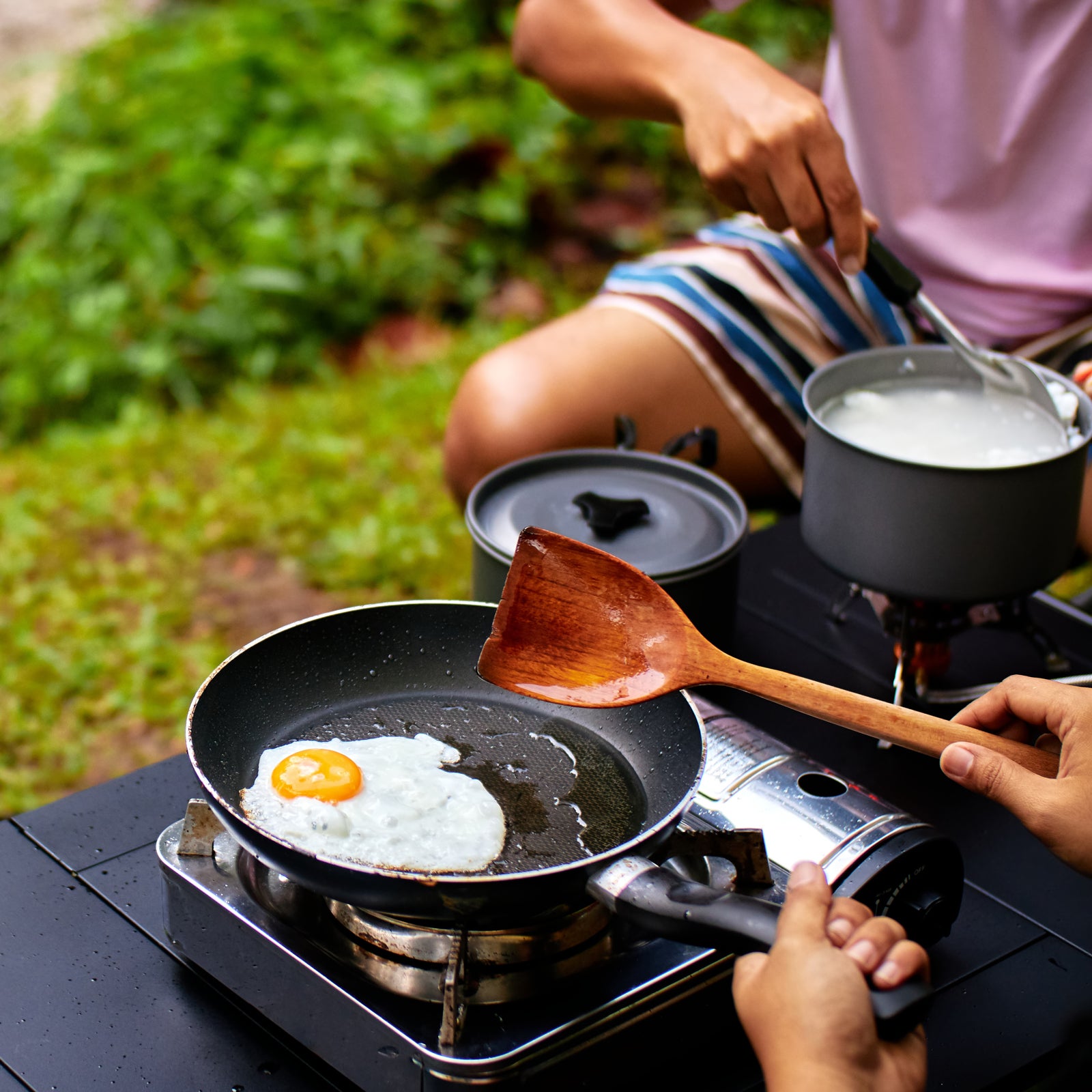My very first piece of camping gear was a $10 ��purchased in the early 2000s that included a��matching plastic plate, bowl,��mug,�����Ի� utensils, all��stored in a net drawstring bag. The fork, knife, and spoon clipped together with a little ring. The mug had notches for measuring liquids. After meals, I dunked the bag of dishes��in warm, soapy water and hung it on a clothesline to dry for the next meal.
Looking back, it was completely unsanitary to not wash each item individually,��but at the time, it seemed genius and innovative. Over the course of nearly 20 years and hundreds of nights under the stars, I’ve replaced that set and added just a few more items to my kit, but still brings me joy. It means��I’m about to set out on a trip that will be packed with memories,��or��that��I’ve just come back from one.
You don’t need to empty your bank account on a mountaineering-style stove to eat well in the woods—or in your backyard. Here’s what it takes��to put together a camp kitchen that is both inexpensive and functional. Some of these items are probably already in your cupboards at home.
A Basic Packing List
- Stove��and fuel (unless you’re using a campfire to cook)
- Lighter or matches
- Dishes (one plate or bowl for each person)
- Mug��or��other drinking vessel
- Spoon, fork, knife��(one��set for each person)
- Sharp knife
- Cutting board
- Pot and/or pan
- Cooler
- Soap
- Sponge
- Towels
- Dish bin
- Water jug
- Water filter
Heat-Source Options
Unless you plan on making sandwiches for every meal, you’ll need a heat source like a fire or a stove to warm your food. Before you decide to rely on a fire,��check the fire restrictions where you plan on camping. Some places don’t allow fires without a fire ring, while others enact restrictions during dry seasons. If one is��allowed, you’re in luck. A fire will keep you warm and toasty, and it’s the cheapest and most basic way to heat your water and meals.
Picking the right stove is a bit more involved, as it’s likely the most expensive and specialized item on this list. Consider what you’ll use the stove for—most likely boiling water, maybe sauteing��vegetables and protein—and how far you’ll be lugging it. The single-burner ($45) is the size of an empty toilet-paper roll and has served me well on backpacking trips and in campgrounds, while the ($80) is��bulkier and heavier but has two burners and a three-sided windscreen. For both, remember to bring propane canisters and a lighter or matches.
Utensils, Dishes, and Cookware
Think about what you use to eat a meal at home—probably a bowl or plate and a fork or spoon. You’ll want these for your camp kitchen, too. The most affordable option is to repurpose items from your kitchen (plastic dishes are cheaper, lighter, and more durable if you have them) or to purchase them��from a thrift store—most sell flatware for less than $1 apiece. If you want something more packable that’s specifically designed to hold up to outdoor use, Primus makes a ($23) that includes dishes, a spice jar, a cup, a spork, and a combination cutting board, colander, grater, and knife. I always bring a small cutting board and a sharpened chef’s knife��to slice vegetables, meats, cheeses, and other snacks.
Whether you’re making coffee, rehydrating freeze-dried meals, or cooking from scratch, you’ll need a pot. A small one from home will do,��or try ($13). If I know I’ll be cooking things and also boiling water, I’ll bring my smallest pan. Snow Peak’s ��($30) is a good option for��a full set of lightweight nesting pots and pans.
Food and Water Storage
What’s on the menu for your camping trip? Will you be cooking meals or adding boiling water to dehydrated backpacking food? If it’s the former, you’ll need a cooler to keep your freshest ingredients from spoiling. The Mountain Khakis Compass 6-Pack��($50) is a tried and true—but small—soft-sided cooler. I’ve kept things cold in the summer with the classic hard-sided ($15)��or�� ($10). In lieu of a table, you can use the top of a flat cooler, your truck’s tailgate, a log, or the ground.
To ensure you have plenty of water for your trip, top off��a reusable water jug or container, preferably one with a spout. You can refill��the jug at a gas station or campground, or if you’re close to a water source, clean your drinking water with a filter like the ($22).
Cleanup Materials
You won’t be bringing your kitchen sink, but you can create a makeshift wash station with a . Add a sponge and a few towels to your kit, along with a trash bag to help you leave no trace. Then, when you get home, wash and sanitize everything again before you stow it away for your��next trip.


